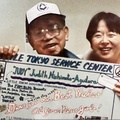Chapter 4 >>
Carlos Yamashita knew that the old man was practically blind to begin with, but since the three of them had arrived in California, Bisabuelo’s sight had worsened. He still stayed alone in the neighboring hotel room, which was more than fine with Carlos. As soon as Bisabuelo awakened in the morning, however, he would call Carlos and his father’s room. Usually Father had left for work already, so it would be up to Carlos to answer the phone by the first ring. If he waited until the second, or ay dios mio, the third ring, Carlos would have to sit through an hour’s worth of scolding. You must learn the Shishido way, Bisabuelo would say in Spanish, going back and forth in his wheelchair. The Shishido way is to be prompt, even early. You must do everything properly, absolutely chanto.
Carlos had little idea what this Shishido business was all about. I’m a Yamashita, he thought to himself. But he did not dare to be contrary to Bisabuelo. Although the old man never laid a hand on him, there was something manic, unstable about him.
Perhaps it was the way that he had arranged the furniture in his room. He had pushed the small table and chairs in a corner (Carlos didn’t know how the old man was able to do that in a wheelchair) and had placed duct tape on the worn rug. The closet was filled with boxes instead of clothes, which were hidden behind an extra blanket. Carlos had seen Bisabuelo give the maids an extra tip to keep their mouths shut. He had purchased a laptop computer and rigged it to speak to him in English. Since Carlos couldn’t understand English that well, he had little idea of the websites that Bisabuelo was accessing. But the old man often received packages of all sizes—Carlos was the one who had to go to the front desk to retrieve them.
Bisabuelo could wash, go to the restroom, make his own coffee, eat breakfast, and even shave on his own. But Carlos would be called in to take Bisabuelo on his regular “strolls.” Carlos actually didn’t mind accompanying Bisabuelo. Oxnard was a green valley—flat fields against magnificent mountains. It was often foggy in the morning and by the afternoon, the clouds had lifted, revealing the craggy line of mountains to the east.
Bisabuelo always brought a map with him. It was a detailed street map affixed with more tape, which served to guide his fingertips. He would ask Carlos to be his eyes, to describe everything on each block—even mentioning any people or pets at each residence.
One morning, a curious little girl about four years old followed them as they made their way down a street. “What are you doing?” she called out to them in Spanish.
Carlos, eager to speak to anyone besides Father and Bisabuelo, stopped.
“Hijo, vamanos.” Bisabuelo said, insisting they leave immediately.
But why, thought Carlos. What could a little girl do to them?
Bisabuelo caught hold of Carlos’s wrist and pressed down. “I said let’s go now,” he repeated in Spanish.
Carlos pushed the wheelchair forward. The little girl followed. “Do you go to school with my brother?” she called out.
Bisabuelo then motioned for Carlos to stop. He turned back to the little girl. “Go away, you little witch,” he hissed at her. He narrowed his eyes and revealed his jagged yellow teeth as if he were a wolf sizing up his next dinner. The girl visibly jumped and ran back to her house.
“Hurry, Carlos,” the old man said. “This is not the place for us.”
After that encounter, Bisabuelo started calling Carlos’s room earlier and earlier. They would leave for their expeditions when it was barely light. Bisabuelo rested a flashlight on his knees and directed towards intersections, waiting to get a full report from Carlos. It was hard to make out colors in the darkness, but he could at least tell Bisabuelo what kind of cars were parked in the driveway. Sometime they would hear seagulls who had strayed from the ocean circling above. From the smell of salt, Carlos knew that the beach wasn’t too far. What would he give to see those waves in person. Carlos felt that he was trapped in the box of the hotel room, in the dark world of Bisabuelo.
The next morning, the phone rang and Carlos felt his heart leap. He knew that it was earlier than usual because most mornings he could see the slim gray line of dawn at the top of the curtains. But not today.
Carlos didn’t get the phone until the second ring. “Si.” Already his hands grew wet.
“Get ready,” said Bisabuelo.
It was 4:30 a.m., just a few minutes after Father must have left for work. Carlos didn’t bother to comb his hair or wash his face. He found his jeans and T-shirt from yesterday on the floor. He stepped into the leg holes of his pants. Convenient, at least.
Bisabuelo was already waiting at the door of his room. Carlos pushed him forward to the elevator and once they reached the first floor, headed north as usual.
“No,” Bisabuelo said. “This time we go south.”
But there wasn’t anything south, except a few new housing developments on the eastside. But Bisabuelo didn’t want to go there. Instead they walked towards a fallow, empty field, rows of dirt apparently turned up by some machine.
“Stop,” said Bisabuelo.
But there’s nothing here, thought Carlos. Perhaps the old man had become completely blind.
“Take this and place it about 200 yards down.” Bisabuelo held out a small white plastic alarm clock. Carlos stood dumbly, staring at the digital numbers, 5:05. “Go!”
Carlos walked through the clumps of dirt. It was wet and stuck to the legs of his pants. A part of him wanted to throw himself into the mounds and disappear like a giant worm. But what would Father do without him? Carlos finally placed the clock about ten rows away from the side of the road.
“Hurry,” Bisabuelo called out.
When Carlos returned, he noticed that a blanket was sitting on the old man’s lap. “What I’m about to show you, you must never share with your father.”
Before the boy could respond, the blanket was lifted to reveal a black gun with a funny cylinder attached to its barrel.
Carlos’s eyes grew big.
“It is for his safety. There are people who want to hurt him. We need to protect him.”
“Why would anyone want to hurt Father?”
“He is doing very important work. Secret work. And only we can protect him.”
It didn’t make sense. If Father was doing secret, important work, why would it be only up to an ancient man and little boy to save him? Carlos licked his lips and studied the gun. His friends back in Paraguay had one to shoot at wolves and rabbits in the fields. That had been a BB gun. This, however, was a real gun. Just like in the movies. Carlos would have preferred a samurai sword, but a gun was enticing as well.
“Take it. I know you want to hold it.” Bisabuelo instructed him to grasp onto the handle to avoid any accidental discharging of the gun.
It was heavy, smooth. The sun was just making its appearance, making the gun gleam in Carlos’s hands. It was the shiniest thing that he had ever touched.
“This here is the trigger,” Bisabuelo explained, carefully and gently moving Carlos’s fingers through the body of the gun. “Pull that back and the gun will go off.”
Just then a high-shrilled noise came out from the field. At first Carlos thought it was a police alarm, but then he realized it was from that silly alarm clock.
“That’s your sign, hijo. Aim and shoot.”
Carlos’s mouth remained open. “You want me to shoot at the clock.”
“Go for the target, hijo! ”
Carlos could feel his heart pulse. Bisabuelo was telling him to do this, so it must be alright. He pressed down on the trigger. Carlos expected to be thrown backward from the pressure, but he just forced a step or two away from where he had been standing.
There was no large bang or pop, just a dull noise from the gun’s barrel. The strange thing attached on the end must have silenced the gunshot.
The alarm continued to ring, much to Bisabuelo’s disgust. “Try again.”
Carlos, who had been so excited to shoot off the gun, now felt stressed. The overturned rows of dirt failed to reveal the white plastic target.
“I can’t see it, Bisabuelo.”
“Here,” the old man wrestled the gun away from Carlos’s hands.
“But—“ How could a blind old man hit a target from such a distance?
The gnarled fingers pressed down on the trigger.
A spurt of dirt rose from a distance and the alarm was immediately silenced.
“How?” Carlos was amazed by Bisabuelo’s shooting ability.
“In time, you will learn to do the same,” the old man promised.
* * *
“You have to stop this, Say.”
“What?” Sayuri turned from her laptop computer screen, rubbing the sore spot in between her shoulder blades.
“All these e-mails, letters, phone calls. Dad and I spent most of the meeting at the strawberry board defending ourselves.” Greg threw his keys down on the counter. Greg never threw things aside from a softball.
“From what?” Usually their board meetings consisted of reports of new strawberry acreage, rules about pesticides, and water conservation.
“About why someone from our company is so keenly interested about Canadians dying from strawberries.”
“But Greg, there’s something here.” Sayuri pointed to the images taped on the wall. The strange vandalism that occurred in their strawberry fields. The breakdown of a new strawberry variety that had been written on the margins of an old Japanese-language book that Greg’s great-aunt had once owned.
“Something? A weird circle and stars? Probably the work of a bored teenager. The writing in that Japanese book—just notes by a hard-working farmer.” Greg then took a deep breath. “Stop,” he said quietly. “Please just stop, Say.”
“And if I don’t stop—” she said.
“I don’t know if there will be an us anymore.” Greg went into the bedroom and Sayuri felt like the bottom of her stomach had fallen down to her knees.
What was she doing, anyway? What she trying to prove? Maybe what Greg had been saying all along was right. That she had too much time on her hands. That she was interfering to feel useful.
Sayuri began to close down her computer when she heard it ding. A new e-mail message. Her mother from Japan, perhaps?
But instead it was an address that she didn’t recognize. It was the subject line that proved to be more interesting: SHISHIDO FARMS KILLS.
Sayuri hurried to open the e-mail message, but it was blank. SHISHIDO FARMS KILLS? Had a disgruntled person from the strawberry board sent that message? Whoever it was, Sayuri wasn’t going to mention anything to Greg. Their marriage was strained as it was—no need to add more gasoline.
That night Sayuri could not sleep well. Greg was bundled up in sheets at the far edge of the bed. She wanted to stroke his head, but she didn’t want to wake him. She would forget all about the Nihongo papers, the weird diagram, the poisoned strawberries. Greg was right: it was none of her business.
Sayuri didn’t know when she finally was able to fall asleep, but when she awoke the sun was up, filling the bedroom with light. No Greg, just mussed-up sheets on the other side of the bed.
As Sayuri got up to make some coffee, she heard the doorbell ring. Greg must have forgotten his house keys.
Sayuri buttoned the top button of her flannel pajamas. No sense in flashing the neighbors. Reciting an apology in her head, she opened the door. Instead of the thin frame of her husband, it was an Asian woman in her late forties, early fifties, her hair carefully coiffed to show off a grey streak in her black hair. This was a woman who wore her age well. She was holding an expensive handbag. Sayuri wasn’t into designer labels, but she was from Japan and couldn’t help but to be exposed to some high-end names and brands. And this bag this woman was carrying was a Louis Vuitton.
“I’m looking for Sayuri Shishido.”
“I am Sayuri.”
“So you’re the one responsible for killing my grandmother.”
* * *
Jorge Yamashita studied the plants in the greenhouse. The seedlings had grown so quickly, much quickly than he imagined. The variety liked the soil here in Oxnard, it was obvious. Someday these plants would spawn others plants and soon the world would be filled with the variety, the Saburo.
The ironic thing was that both Jorge and his son Carlos were allergic to strawberries. So Jorge could only imagine their taste. He could still feel the texture, their firmness. See the brilliant, blood-red color and heart-shaped form. Smell the fresh sweetness.
Once the Oxnard farm was their’s, the Saburo would not go to just places like eastern Canada, but all throughout the United States. Japan. Europe. That was Grandfather’s dream.
Jorge didn’t have such grand ambitions. He was happy to have lived his whole life in Paraguay. There were Japanese-language schools for Carlos on the weekends, community gatherings, and Japanese stores. It was safe, much safer than California, he imagined. But Grandfather insisted that they return to his birthplace. The Chinese had called it Gold Mountain, he said. It is the most amazing place in the world.
It was difficult to dispute Grandfather. He had been the one who had given Jorge and his wife Keiko the money for the farm in Paraguay. He was actually Keiko’s grandfather, but now he had become Jorge’s. He had made arrangements for the best medical care in Paraguay for Keiko. Family, kazoku, was everything to him.
While Keiko was in the hospital, Grandfather shared secrets about their family to Jorge in the waiting room. That he had rescued Keiko’s mother from the Shishidos. They had sold off their daughter. Abandoned her because she wasn’t perfect.
They are killers. Actually worse than killers.
But Jorge didn’t see that reflected in the Shishido family today. Bob was a fair man. And so was the son Greg.
Grandfather, I think that the family has changed. But Grandfather could not be persuaded. The family had discarded the weak. They had stolen. They had to be stopped. Grandfather claimed that the farm was his. That the money from the Watsonville farm had gone into the Oxnard one.
It was their duty to return it to the rightful owner. Grandfather. And someday Carlos.
Angel bueno, his wife had called the old man. After I’m gone, please take of our good angel. Jorge promised, but now was having doubts. Their angel seemed to be falling, and somehow taking Jorge and Carlos with him.
* “The Nihongo Papers” is a work of fiction. The characters, incidents, and dialogue are drawn from the author’s imagination and are not to be construed as real. Any resemblance to actual events or persons, living or dead, is entirely coincidental.
© 2008 Naomi Hirahara





